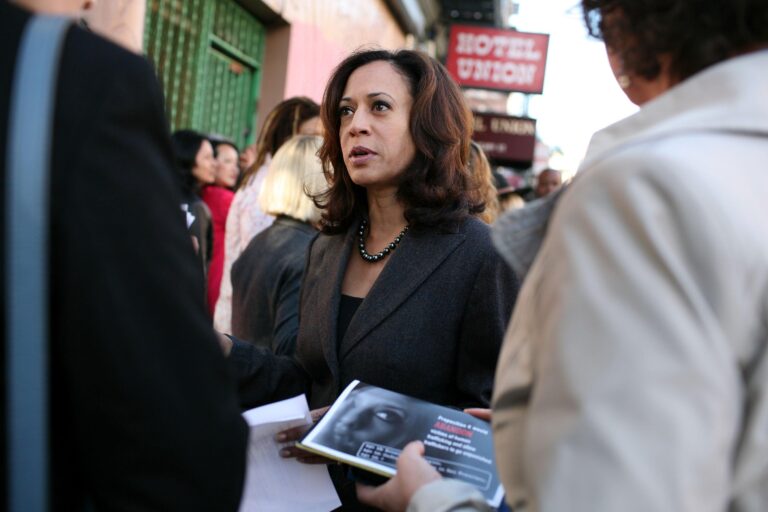San Francisco has long been a crucible for progressive politics and a breeding ground for influential Democratic leaders. At the heart of this political vibrancy lies a powerful and well-organized Democratic machine that has shaped the careers of numerous public figures, none more prominent today than Vice President Kamala Harris. This article examines how the city’s entrenched political network and its strategic alliances propelled Harris from local district attorney to a national figure and ultimately to the launchpad for her presidential campaign. By tracing the intricate connections and grassroots mobilization rooted in San Francisco, we uncover the political machinery that played a pivotal role in shaping one of the most consequential candidacies in recent American history.
San Francisco’s Democratic Roots Shaping Kamala Harris’s Political Ascent
San Francisco’s political landscape has long been a fertile ground for progressive values, activism, and Democratic leadership, creating a nurturing environment for emerging politicians like Kamala Harris. Her rise through the ranks—from District Attorney to Attorney General of California, and eventually the U.S. Senate—was deeply influenced by the city’s established Democratic networks. These connections provided her with vital support systems, resources, and a platform from which she could advocate for reform on criminal justice, immigrant rights, and economic equality. The city’s deep roots in Democratic policies fostered a political culture that values innovation and inclusivity, both hallmarks of Harris’s campaign narratives.
Key elements of this political ecosystem include:
- Strong grassroots organizations mobilizing diverse communities
- Collaborations with labor unions and progressive advocacy groups
- Access to influential mentors and party leaders
- A media environment receptive to progressive messaging
| San Francisco Political Features | Impact on Harris |
|---|---|
| Longstanding Democratic dominance | Solid voter base and trusted party endorsement |
| Progressive reform agenda | Policy alignment and leadership opportunities |
| Community engagement initiatives | Grassroots mobilization and voter outreach |
| Strong media presence | Effective narrative shaping and national visibility |
Key Players and Strategies Within the City’s Democratic Network
San Francisco’s Democratic network operates as an intricate web of influence, uniting seasoned politicians, grassroots organizers, and key interest groups. Prominent figures like Speaker Nancy Pelosi and former Mayor Willie Brown have traditionally shaped the city’s political landscape, leveraging their extensive connections to elevate emerging leaders. This tightly knit community excels in crafting tailored strategies that prioritize coalition-building and fundraising, ensuring sustained momentum behind promising candidates. By collaborating closely with local labor unions, advocacy groups, and the city’s progressive voter base, the network has nurtured political talent in a highly competitive environment, setting the stage for national ambitions.
Central to these efforts is a multifaceted approach that blends data-driven outreach with on-the-ground mobilization. Campaign teams deploy sophisticated voter targeting tools alongside door-to-door canvassing and community forums to cultivate deep relationships with constituents. The table below highlights some of the core strategies and their respective contributions to electoral success:
| Strategy | Impact |
|---|---|
| Coalition-building | Unifies diverse groups for collective backing |
| Targeted Fundraising | Generates essential financial resources |
| Data Analytics | Fine-tunes voter outreach efforts |
| Grassroots Mobilization | Enhances voter turnout and engagement |
Through these dynamic strategies, San Francisco’s Democratic network functions as a political incubator, capable of propelling local leaders like Kamala Harris onto the national stage, demonstrating the enduring strength and adaptability of the city’s political machinery.
The Role of Local Policies in Building a National Campaign Foundation
Local policies in San Francisco have been instrumental in cultivating the political environment that shaped Kamala Harris’s rise. The city’s progressive initiatives, especially in criminal justice reform and social equity, provided her with a platform to develop a distinct public identity rooted in community advocacy and systemic change. These policies not only addressed immediate local concerns but also offered a microcosm of national issues, positioning Harris as a candidate capable of tackling challenges on a broader scale. Her tenure as San Francisco District Attorney and later as California Attorney General was marked by high-profile reforms that resonated with voters beyond state borders.
Key local policy influences included:
- Criminal justice reform: Emphasis on reducing incarceration rates and promoting restorative justice.
- Economic equity: Initiatives supporting affordable housing and small business growth.
- Environmental justice: Policies aimed at sustainable urban development and combating climate change.
- Community engagement: Strategies to increase civic participation among marginalized groups.
| Policy Area | Impact on Harris’s Campaign |
|---|---|
| Criminal Justice | Built reputation as a reformer, appealing to progressive voters |
| Economic Equity | Demonstrated commitment to addressing inequality and supporting working families |
| Environmental Policy | Aligned her platform with emerging national climate priorities |
Lessons for Political Candidates from San Francisco’s Democratic Model
The San Francisco Democratic political apparatus is a blueprint in strategic networking, grassroots engagement, and coalition-building. Political candidates looking to emulate this model should prioritize building robust local alliances that extend beyond mere endorsements, tapping into community organizations and labor unions to create a foundation of sustained support. The city’s unique political environment, characterized by its progressive values and demographic diversity, also underscores the importance of tailoring campaign messaging to resonate authentically with varied constituencies.
Moreover, candidates can learn from the deliberate grooming of local leaders who progressively ascend the political ladder, as seen in Kamala Harris’ trajectory. This approach underscores crucial lessons:
- Invest in early career mentorship: Cultivating young political talent helps build a pipeline of future officeholders.
- Leverage city-wide visibility: Success in a diverse, high-profile city like San Francisco offers a launchpad for national ambitions.
- Prioritize policy innovation: Bold local initiatives can showcase leadership qualities attractive to broader electorates.
| Key Element | Impact on Career | Strategy Example |
|---|---|---|
| Local Coalitions | Stable base of voter support | Partnership with tenant associations |
| Progressive Policy Agenda | Enhances national profile | Championing criminal justice reform |
| Mentorship Programs | Building leadership pipeline | Encouraging political internships |
The Conclusion
In tracing the roots of Kamala Harris’ presidential bid, it becomes clear that the intricate web of San Francisco’s Democratic political machine played a pivotal role in shaping her trajectory. From early endorsements to strategic alliances forged within the city’s influential party apparatus, Harris’ rise reflects the enduring impact of local political dynamics on national ambitions. As her campaign unfolds on the presidential stage, understanding these foundational connections offers valuable insight into the forces that continue to shape American political leadership.




